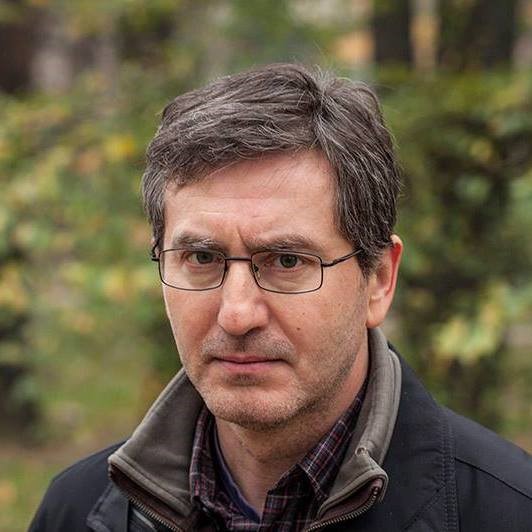
Hasan Nuhanović
Hasan Nuhanović was an interpreter for the United Nations in Srebrenica and saw his family murdered when the town fell to the Bosnian Serb Army. In the years since he has campaigned for justice for the victims of Srebrenica.
I am seeking justice. If I had not done this I would not be able to go on with my life.
Download Hasan’s bilingual life story
Hasan Nuhanović was born on 2 April 1968 in Zvornik, Bosnia and Herzegovina, to Bosnian Muslim parents Ibro and Nasiha Nuhanović. Hasan enroled in the University of Sarajevo as a mechanical engineering student. His father Ibro was a businessman, his mother Nasiha looked after the family home and his younger brother Mohammad attended high school.
When Yugoslav President Josip Broz Tito died in 1980, ethnic and national tensions began to tear Yugoslavia apart.
In 1992 in Bosnia and Herzegovina conflict broke out between Serbs, Croats and Bosnian Muslims, also called Bosniaks. With Bosnian Serb forces intent on ethnically cleansing the region, Hasan, who was home from university, and his familly were forced to flee their home in Vlasenica. They fled to Srebrenica, a town where Hasan’s uncle lived. Here they would remain for three years.
Srebrenica, a Bosniak town besieged by the Bosnian Serbs, became a symbol of resistance for the Bosniak cause. The Bosnian Serbs prevented essential supplies from reaching the civilians inside the town. With the town’s pre-war population swollen to 60,000 by refugees, Hasan remembers terrible conditions in Srebrenica, with little food, water or electricity available to the desperate people trapped there. Long before 1995, Srebrenica was a humanitarian disaster.
In April 1993 the United Nations Security Council declared Srebrenica a ‘safe area’, and 150 Canadian soldiers arrived in the town. Hasan went to talk to them and, as he spoke English, he was hired as an interpreter for the Canadians. He continued in this role when they were replaced by 600 Dutch soldiers. UN troops in Srebrenica were only authorized to use lethal force in cases of self-defence. Protecting civilians inside Srebrenica did not meet this criteria.
The Bosnian Serb Army entered Srebrenica on 11 July 1995, and immediately began to separate Bosniak men and boys over the age of 13 from the rest of the population, searching for ‘war criminals’. Women and children were put on buses and deported from Srebrenica. 8,372 men and boys were shot over the course of the next few days, with the majority being murdered between 11 – 13 July.
Hasan and his family, along with thousands of other refugees, fled to the UN base at Potocari, near Srebrenica, hoping that the Dutch troops and the UN flag would protect them. Despite clear evidence that preparations for a massacre of Bosniak men were underway, the Dutch failed to stop deportations of Bosniak civilians, and forced Hasan and his family to leave the base.
Hasan, as an employee of the UN, was entitled to stay, but his family were not. Hasan had to translate the Dutch order for his family to leave. Hasan pleaded with the Dutch to allow his family to remain inside the base, but they were not allowed. Hasan wanted to leave with his family but they refused to let him go with them, knowing they would all be murdered. This was the last time Hasan would see his family alive.
In the years following the Srebrenica genocide Hasan, like tens of thousands of other desperate people, had no idea what had happened to his family. In 2006, after 11 years of searching, the body of his father Ibro was identified, followed three years later by his mother Nasiha. In 2010 Hasan helped to confirm suspected remains of his younger brother Mohammad. Hasan immediately recognised the distinctive shoes and jeans he had bought for his brother in the spring of 1995.
In 2008, Hasan brought a civil court case against The Netherlands. The case stated that because Dutch troops had handed over Hasan’s father, brother and a third man named Rizo Mustafic to the Bosnian Serbs, they had committed war crimes, had been involved in genocide and had violated fundamental human rights.
In 2013, after over five years of trials, the Supreme Court of the Netherlands agreed with Hasan. The Netherlands had been in control of Dutch soldiers in Srebrenica, and was liable for the deaths of Ibro Nuhanović, Mohammad Nuhanović, and Rizo Mustafić.
The Netherlands was required to pay compensation to the families, and the case set a hugely important precedent in international law. For Hasan, the verdict marked the culmination of his efforts since 1995 to force the international community to take responsibility for its part in the Srebrenica genocide.
‘What I was thinking about was that The Netherlands soldiers, officers, did this to my family, and they had to be declared responsible…I won the case, in some way, I won the case. And it was for my family.’
Hasan’s struggle for justice has often seen him fighting denial of the Srebrenica genocide in Bosnia and Herzegovina and the wider international community, and he strongly supports the work of the International Criminal Tribunal for the former Yugoslavia.
‘I talk to my people…they say ‘My god this is not justice. Hasan this is not justice, when are we going to get any justice?’ And I say listen, this is as good as it gets. This is the maximum we are going to get…I really think we should support the work of the ICTY, because the Serbs are saying the court does not have legitimacy. If we say that then what’s the point?’
Hasan lives in Sarajevo, and continues to campaign for justice for the victims of Srebrenica. Through his activism Hasan hopes to ensure that Bosnia is able to move on and face the future, while acknowledging its tragic past.
For more information: